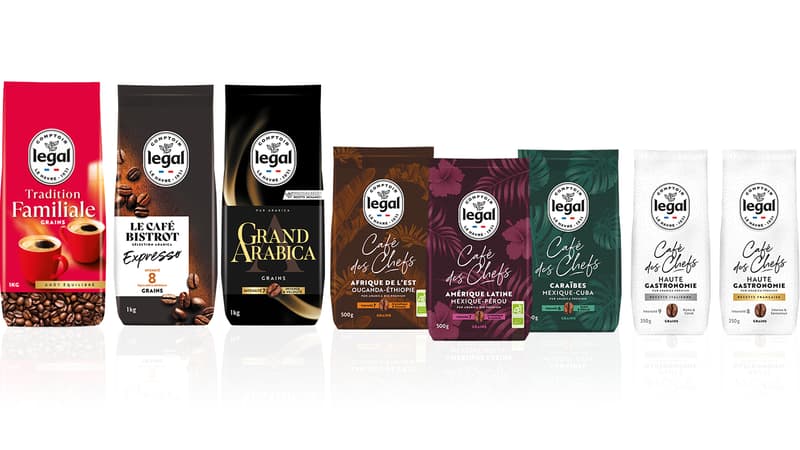“Legal, taste”… and the return? Popular brand from the 90s, which even hired Johnny Hallyday for its advertisements, Legal Cafés want to believe in a second youth.
The Norman roaster, after briefly passing into the hands of Michel Ohayon, was bought last June by the FNB investment fund, specialized in SMEs in the food sector and already recent buyer of Mousline dehydrated purees. The opportunity for a new strategy to give new life to a brand that, after experiencing a golden era, has fallen asleep on the shelves.
Because coffee whets the appetite. The arrival of Nespresso, Senseo and other Tassimo machines has shaken and, above all, greatly improved the market over the last twenty years. Single-dose and capsules have invaded kitchens, moving away from traditional ground and instant coffee. Without forgetting the victorious return of coffee beans at the beginning of the 2020s and then the increase in domestic consumption after the health crisis. Large retailers sell no less than 200,000 tons of coffee every year, representing 3 billion euros in turnover.
“The greatest of the small actors”
Three giants currently monopolize 70% of the French coffee market: the Swiss group Nestlé (Nescafé, Ricoré, Nespresso, Dolce Gusto, Starbucks at Home), the Dutch conglomerate JDE (L’Or, Tassimo, Senseo, Jacques Vabre, Maxwell House , Grand-Mère, Velours Noir) and the Italian group Lavazza (Lavazza, Carte Noire). Added to this are private labels, which occupy an additional 20%. There is only about 10% left to share between all the other brands, which swim at roughly the same level as each other.
However, “there is a real opportunity” for legal coffees, underlines its new CEO, Christophe Pouyès, who took over as director of the company after the purchase by the FNB fund. The Normandy roaster, today the seventh player in the French market, aims to rise to fourth place in the next two years by betting on its different sub-brands to make all consumer profiles compatible. Without also forgetting that a third of the activity is dedicated to the manufacture of own brand products for large retail brands.
New logo and end of capsules.
To achieve this, the Le Havre SME has already reworked its identity. Gone is the old “Legal, taste” logo, giving way to a new “Legal – Comptoir Le Havre 1851” logo, which plays with local heritage and image. Christophe Pouyès rules out, however, any promotion strategy.
“Historically they are considered accessible products,” he points out. The new management has also accelerated the optimization of the portfolio, already undertaken by the previous shareholder, reduced from 70 to 30 references. In particular, it was decided to stop selling Nespresso compatible capsules.
This is your great challenge: to improve your visibility and your presence on the shelves. “We prefer to refocus on our pillars” so that the offer is the same everywhere, “rather than having a multitude of references that we find here or there,” explains Christophe Pouyès. Present today in 65% of large retailers, the brand wants to get closer to 100%. It also targets specialized distributors, such as organic or multi-fresh brands. The company has 130 employees, of which a hundred in its factory in Le Havre, with a turnover of 60 million euros.
Source: BFM TV


